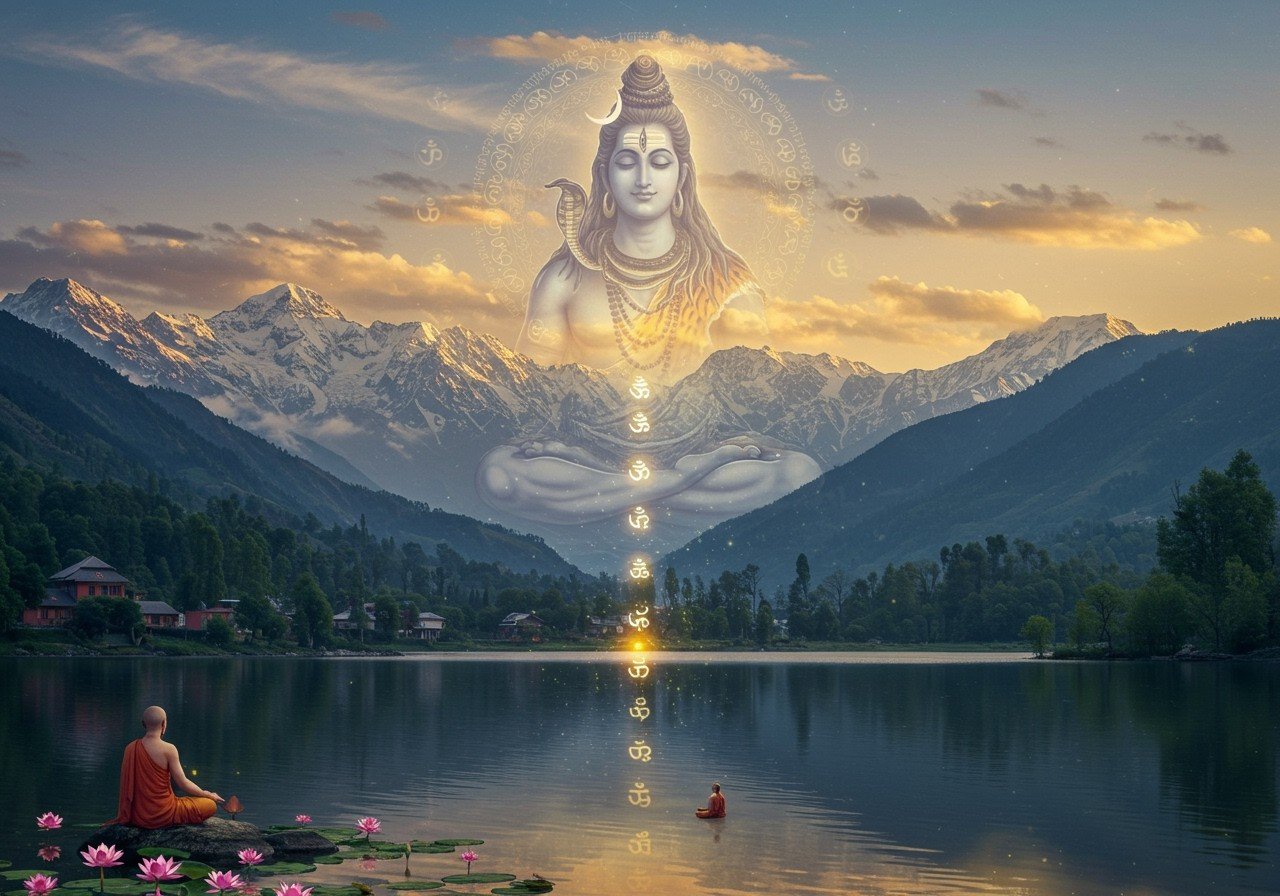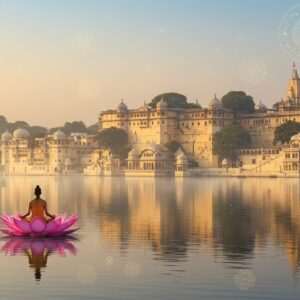
Kashmir Shaivism, a profound spiritual tradition from the heart of India, offers a unique perspective on liberation, or moksha. It’s not simply about escaping the cycle of rebirth, but about realizing the divine unity within ourselves and the universe. This blog delves into the core principles of liberation in Kashmir Shaivism, exploring its relevance in our modern lives.
Understanding Moksha: Beyond the Cycle
In Kashmir Shaivism, moksha transcends the conventional idea of escaping rebirth. It’s a journey of self-realization, a profound recognition of our true nature as Shiva, the supreme consciousness. This process, known as Pratyabhijna, involves dissolving the ego and realizing our inherent divinity. The path of Anupaya, spontaneous liberation, emphasizes going beyond structured spiritual practices, highlighting the role of Shaktipata, the descent of divine grace, as crucial for this transformative journey. Dive deeper into the interconnected journey of Karma, Reincarnation, and Dharma in our dedicated blog post.
Self-Realization: Unveiling the Divine Within
Imagine experiencing the universe as a vibrant, interconnected tapestry. In Kashmir Shaivism, self-realization is about perceiving ourselves as integral threads in this cosmic fabric. Spanda, the dynamic pulse of the universe, is key to this understanding. The ancient text, the Vijnana Bhairava Tantra, offers 112 meditation techniques to guide us toward realizing our true selves. The four paths, or Upayas—Anavopaya, Shaktopaya, Shambhavopaya, and Anupaya—serve as guiding lights on this journey of self-discovery. Reaching this state leads to Sahaja Samadhi, a state of blissful union with the divine, where peace and joy become our constant companions. Explore the Shankaracharya Temple, a place of deep spiritual significance, in our comprehensive guide.
The Role of Rituals and Practices: A Path to Connection
Rituals and spiritual practices in Kashmir Shaivism are not mere customs, but powerful tools for awakening spiritual consciousness. Mantra Yoga and Jnana Yoga illuminate the path toward self-realization. Practices like Mudras and Bandhas help channel energy within, fostering a deeper connection with our inner selves. The sacred Guru-disciple relationship plays a vital role in transmitting spiritual knowledge and grace. Bhairava Yajnas, transformative rituals, purify the mind and body, creating space for spiritual awakening. Dharana, the practice of concentration, helps transcend mental limitations, bringing us closer to the experience of unity.
Modern Relevance of Kashmir Shaivism: Timeless Wisdom for Today’s World
In today’s fast-paced world, the teachings of Kashmir Shaivism offer a timeless wisdom that transcends religious boundaries. Its principles provide solace and guidance in navigating modern existential anxieties, offering a path toward inner peace and fulfillment. There’s a growing global interest in Kashmir Shaivism, reflected in retreats, studies, and its integration with modern mindfulness and meditation practices. This holistic philosophy empowers individuals to discover their purpose and place in the vast universe. It can help us lead more fulfilling lives rooted in self-awareness and spiritual connection.
Enlightenment in Kashmir Shaivism: Embracing Oneness
At the heart of Kashmir Shaivism lies the concept of enlightenment, a profound journey of self-realization. It’s not just an abstract idea, but a lived experience of unity with the entire universe—a state of interconnectedness with all beings and things. Imagine feeling deeply connected to everyone and everything around you, experiencing the world as an extension of yourself. This sense of oneness is the essence of enlightenment.
Non-dualism is a cornerstone of this philosophy. It involves transcending the illusion of separation, recognizing that the perceived division between ourselves and the universe is merely a construct of the mind. Kashmir Shaivism identifies this sense of duality as the root of ignorance and suffering. By embracing non-dualism, we begin to heal this separation and experience the peace that comes from recognizing our inherent interconnectedness. Explore the divine feminine power in our blog post about Shakti Peethas and Navadurga.
The ultimate goal is Sahaja Samadhi, a state of effortless, unwavering bliss-consciousness while living an ordinary life. It’s about carrying a sense of inner peace and joy within you, regardless of external circumstances. This state is not about escaping the world, but about engaging with it from a place of deep inner serenity.
The journey of enlightenment hinges on the concept of recognition. It’s the realization that Shiva, the Supreme Consciousness, is recognizing itself through us. The jiva, the individual soul, awakens to its true nature as Shiva, breaking free from the limitations of the ego and experiencing its inherent divinity. This recognition is not a mere intellectual understanding, but a profound shift in consciousness.
Pathways to Enlightenment: Tools for Transformation
Kashmir Shaivism provides a variety of practical paths for achieving enlightenment. These are accessible to anyone seeking spiritual growth and self-discovery.
- Yogic methods such as asana (physical postures), pranayama (breath control), and dhyana (meditation) offer powerful tools for calming the mind, balancing energies, and awakening inner consciousness. These practices prepare the ground for deeper spiritual exploration.
- Balancing theory and practice is crucial. Studying scriptures provides intellectual understanding, while meditation allows us to embody this wisdom and integrate it into our daily lives. Delve deeper into the spiritual heart of Kashmir with our exploration of the Shankaracharya Temple.
- Direct experience is at the heart of the journey. Through contemplation, meditation, and mindful living, we can directly experience the supreme truth within our own lives. This involves cultivating a deep sense of self-awareness and paying attention to the subtle nuances of our inner world.
- The four Upayas offer distinct approaches to enlightenment:
- Anupaya (no path) emphasizes natural, effortless realization, arising spontaneously from within.
- Sambhavopaya (the path of Shiva) focuses on cultivating awareness of one’s inherent divine nature.
- Saktopaya (the path of Shakti) involves harnessing energy and willpower to propel oneself towards enlightenment.
- Anavopaya (the atomic path) uses sensory experiences and mental processes as stepping stones for spiritual growth.
How Poojn Supports Your Spiritual Journey
At Poojn.in, we offer a curated selection of items to support your exploration of Kashmir Shaivism. Our collection includes:
- Sacred Texts: Original Sanskrit scriptures and translations of essential Kashmir Shaivism texts like the Pratyabhijnahrdayam and Shiva Sutras, providing you with authentic sources of wisdom. Browse our collection of Sacred Texts.
- Meditation Supplies: High-quality meditation mats, cushions, and accessories to create a comfortable and conducive environment for your practice, enhancing your focus and inner peace. Find your perfect Meditation Supplies.
- Pure Copper Items: Traditional copper vessels and items used in Kashmir Shaivite rituals, crafted with care and reverence to support your sacred practices. Explore our Pure Copper Items.
- Authentic Rudraksha: Certified Rudraksha malas specifically recommended for Shaivite practices, imbued with spiritual significance and energetic properties. Discover our Authentic Rudraksha Malas.
- Pure Ghee Diyas: Pure ghee diyas for maintaining continuous spiritual practices and rituals, creating a sacred ambiance and invoking divine blessings. Shop our Pure Ghee Diyas.
- Murtis: Divine Murtis for your home altar, meticulously crafted to deepen your connection with the divine. Find Murtis for your home.
For personalized guidance, contact us:
- Phone: 03369029784
- WhatsApp: 9476142738
Our team can help you choose authentic items aligned with Kashmir Shaivism traditions. We offer secure online payments and pan-India delivery, making traditional spiritual items easily accessible while preserving their sacred essence. Visit www.poojn.in to explore our complete collection.
Embracing Liberation: Your Path Unfolds
Kashmir Shaivism offers a profound journey of liberation—a path of self-discovery and realization of our inherent unity with the universe. It encourages us to transcend limitations, embrace our true nature, and live with awareness and compassion. As you embark on this path, remember that enlightenment is not a distant destination but a continuous unfolding. Through meditation, study, or simply being present in each moment, we move closer to the ultimate freedom—union with the divine.
FAQs on Liberation in Kashmir Shaivism
What is Kashmir Shaivism? Kashmir Shaivism is a non-dualistic tradition of Hinduism that emphasizes the individual’s potential for spiritual realization and union with the divine. It originated in Kashmir, India, and is known for its rich philosophical and practical teachings. It emphasizes experiencing the divine within oneself and in the world around us.
How does Kashmir Shaivism define liberation? Liberation in Kashmir Shaivism, also known as moksha, is not just about escaping the cycle of birth and death. It is about recognizing one’s true nature as Shiva, the supreme consciousness. It involves realizing the inherent unity between the individual self and the universal consciousness.
What role does self-realization play? Self-realization is the cornerstone of liberation in Kashmir Shaivism. It is the process of recognizing one’s true identity as Shiva, thus dissolving the illusion of separation from the divine. This understanding leads to a state of freedom and bliss.
How can one achieve liberation? Kashmir Shaivism offers various paths to liberation, including meditation, contemplation, and the study of sacred texts. These practices aim to cultivate self-awareness, purify the mind, and awaken one’s inherent divine potential. It is often emphasized that the grace of a guru can be instrumental in this journey.
Why is Kashmir Shaivism significant in understanding freedom? Kashmir Shaivism provides a unique and profound perspective on freedom by emphasizing the inherent divinity within each individual. It teaches that true freedom comes from realizing this inner divinity and experiencing unity with the universal consciousness. This realization liberates one from the limitations of the ego and the cycle of suffering.
What practices are recommended for liberation? A variety of practices support the journey towards liberation, including meditation, chanting of mantras, and contemplation on the nature of reality. These practices help cultivate inner stillness, expand awareness, and facilitate the recognition of one’s true self. Physical practices like yoga can also be beneficial in preparing the body and mind for deeper spiritual work. Enhance your practice with an Adiyogi Murti.
Is liberation in Kashmir Shaivism different from other philosophies? While many spiritual traditions address the concept of liberation, Kashmir Shaivism offers a distinctive approach by emphasizing the recognition of one’s inherent identity with Shiva. This non-dualistic perspective distinguishes it from philosophies that posit a fundamental separation between the individual and the divine. The concept of *Spanda*, the dynamic vibration of consciousness, is also unique to this tradition.
Can anyone follow this path? Yes, the path of Kashmir Shaivism is open to anyone who seeks spiritual growth and understanding of their true nature. It welcomes seekers from all backgrounds and encourages a personal exploration of the teachings and practices that resonate most deeply. Bring the divine presence into your home with a Lord Shiva Murti.


